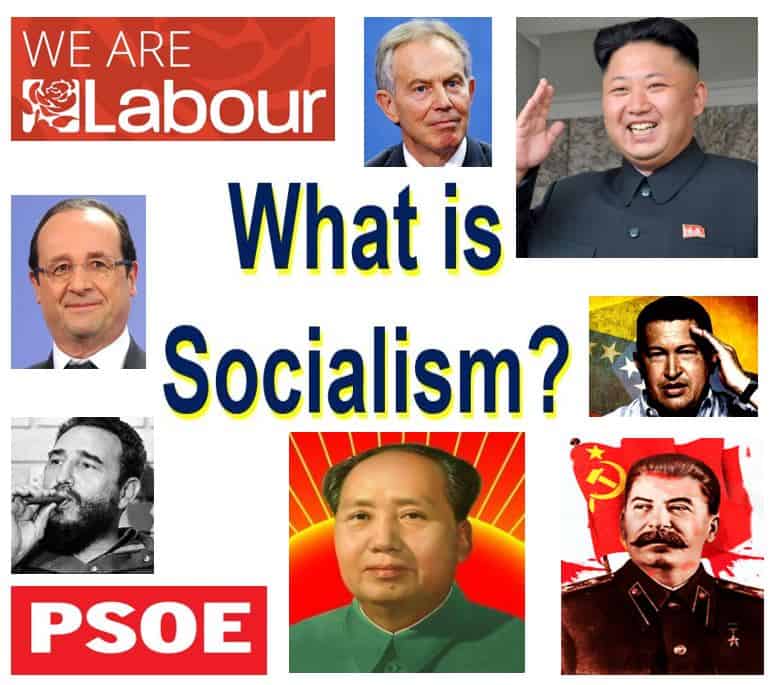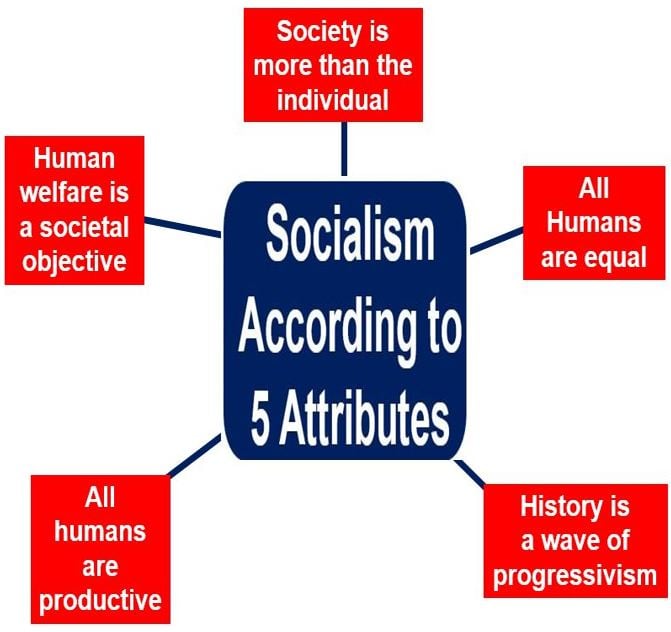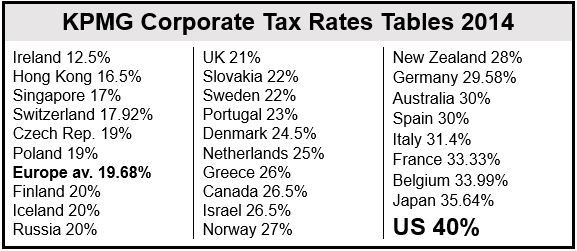Socialism is a social economic system under which the components of production are owned, administered, and controlled by the people – the workers. In a socialist society, the strategic industries, services, and natural resources are collectively owned by all the people. The democratic organization of the people within these industries and services is the Government. However, there are many interpretations, and in several countries, socialism exists as part of a capitalist system.
Socialism, according to socialists in the world’s advanced economies, is not the same as communism. They say that it does not mean government or state ownership. However, all communist regimes in the past and present describe their systems as socialist. In fact, the former Soviet Union was call the USSR – the Union of Soviet Socialist Republics.
According to Marxist theory, it is a transitional state in society between the overthrow of capitalization and the realization of communism.
 All the people and parties in this image claim to be committed to socialism. However, the difference between Tony Blair and Josef Stalin is massive, as is the difference between Mao Zedong and François Hollande. The term can be interpreted in many ways.
All the people and parties in this image claim to be committed to socialism. However, the difference between Tony Blair and Josef Stalin is massive, as is the difference between Mao Zedong and François Hollande. The term can be interpreted in many ways.
In this article, the meaning of socialism focuses on how socialists in the advanced economies – especially in Western Europe – describe it.
Socialism has many interpretations
Socialism is a range of social and economic systems where the means of production form part of social ownership and democratic control.
Social ownership has a range of interpretations, which may mean cooperative, collective or public ownership. Many socialists believe that even citizen ownership of equity forms part of socialism.
There are several types of socialism, depending on who you talk to or which party you belong to. The common element found in its various forms is social ownership.
 Former British prime ministers Winston Churchill and Margaret Thatcher were strong believers in the free market.
Former British prime ministers Winston Churchill and Margaret Thatcher were strong believers in the free market.
According to Oxford Dictionaries, socialism is:
“A political and economic theory of social organization which advocates that the means of production, distribution, and exchange should be owned or regulated by the community as a whole.”
“Policy or practice based on the political and economic theory of socialism. (In Marxist theory) a transitional social state between the overthrow of capitalism and the realization of Communism.
Socialism meaning Social Democracy
Over the past 100 years, the term ‘socialism’ has been widely and flexibly used to describe a wide range of positions including social democracy, Soviet state communism, and anarchism.
The socialist parties of Western Europe, such as Britain’s Labour Party, have generally promoted Social Democracy.
Social Democracy is an economic, social and political ideology that supports social and economic interventions to promote social justice within a free market (capitalist) economy.
Social democrats believe in a policy regime that includes collective bargaining arrangements, measures to reduce income inequality (the wealth gap), and the regulation of the economy for the greater good of the nation and the provision of the welfare state. In this context, welfare state refers to financial assistance from the government to vulnerable groups of people.
Supporters of social democracy believe in a capitalist system that is completely democratic, egalitarian and solidaristic. Britain’s Labour Party members, as well as their counterparts in Germany, France and the rest of Western Europe, point to the Nordic model in Scandinavia during the second half of the 20th century as the best example of what they believe in.
 In his book – Ideologies and Political Theory: A Conceptual Approach – Prof. Michael Freeden, from the University of London, identified a socialist according to the five attributes listed in the image above.
In his book – Ideologies and Political Theory: A Conceptual Approach – Prof. Michael Freeden, from the University of London, identified a socialist according to the five attributes listed in the image above.
Soon after the end of WWII, the British Labour Party and its sister parties across the Channel rejected the Stalinist political and economic model of the Soviet Union.
They committed themselves to a compromise between socialism and capitalism. They supported a mixed economy, private property, and a proportion of essential utilities and public services under private ownership.
Social democracy, or Western European socialism became associated with state interventionism – Keynesian economics – and abandoned the pre-war goal of completely replacing the capitalist system.
The socialist or social democratic parties in Western Europe today aim to curb inequality, oppression of underprivileged groups and poverty. They support universally accessible health care, education, care for the elderly, child care, other public services, and worker’s compensation. In this article, compensation means wages and other benefits paid to employees for their work.
 Karl Marx once said: “The meaning of peace is the absence of opposition to socialism.” One could interpret his comment as intolerance to diverse opinions – a fundamental component of a healthy democracy. (Image: Wikipedia)
Karl Marx once said: “The meaning of peace is the absence of opposition to socialism.” One could interpret his comment as intolerance to diverse opinions – a fundamental component of a healthy democracy. (Image: Wikipedia)
Difference between Communism and Socialism
If you look through the Internet, you will see literally thousands of articles explaining the difference between socialism and communism – and thousands of different explanations. After a week’s worth of researching, you may well end up more confused than you were before you started.
So, let’s look at the stark, clear, black-and-white differences between the two systems, and ignore all the other ambiguous shady areas:
– Democracy: there is no room in communism for democracy. Over the past 100 years, not one communist state has had free democratic national elections. In the Soviet Union you never saw the range of political parties that existed in Western Europe or North America. Any party leader who publicly said that communism sucked would have been arrested and sent to a prison camp.
 Mikhail Gorbachev, General Secretary of the Communist Party of the Soviet Union from 1985 until 1991, when the party was dissolved, once said: “The market came with the dawn of civilization and it is not an invention of capitalism. If it leads to improving the well-being of the people there is no contradiction with socialism.” (Image: Wikipedia)
Mikhail Gorbachev, General Secretary of the Communist Party of the Soviet Union from 1985 until 1991, when the party was dissolved, once said: “The market came with the dawn of civilization and it is not an invention of capitalism. If it leads to improving the well-being of the people there is no contradiction with socialism.” (Image: Wikipedia)
Socialism promotes democracy. Socialism wants people to democratically decide more things than they currently do in most countries. So, as far as democracy is concerned, socialism and communism could not be further apart.
– Capitalism: communism rejects the capitalist system completely. It does not allow private ownership of property or businesses. Socialism, especially in Western European political parties, accepts the capitalist free-market system.
– Ownership of Property: communists say that all property belongs to the state, while socialists accept that most property can belong to the individual.
Some people say that while communism is a political system, socialism is mainly an economic system. In a communist system, the working class is in charge of society by having the government control all means of production. In a socialist system, the focus is on making sure that all citizens have their basic needs met.
Devout communists believe that violence is an acceptable means of changing society to reach total worker (state) control. Socialists, however, work within capitalism rather than attempting to eliminate classes completely.
Socialism focuses on taxes and regulation, and not the violent overthrow of the established political order.
Difference between socialism and capitalism
If you are a pure communist believer, you will see all socialists as capitalists. If you are a pure capitalist believer, you will see all socialists as communists. Does that mean that socialist beliefs are somewhere in between the other two extremes?
In both capitalist and socialist systems, the means of production and the goods and services they provide are owned by entities.
In capitalism’s case, property and assets are privately owned. In a socialist system, private property can exist and citizens can own their businesses, however, the Government creates social nets to help the poor and prevents businesses from taking too much profit.
In a socialist system, there is more government intervention and interference in the economy compared to a capitalist system.
The focus of capitalism is competition, while that of the socialist is cooperation.
 According to this Corporate Tax Rate table, the United States – at 40% – is the most socialist of all the advanced economies. (Image Data Source: home.kpmg.com)
According to this Corporate Tax Rate table, the United States – at 40% – is the most socialist of all the advanced economies. (Image Data Source: home.kpmg.com)
Today, no country is 100% capitalist or 100% communist. Even in the United States, which claims to be the flagship of the free market, there are social networks such as SNAP, Medicare, Social Security, and the government (taxpayer) intervenes to bail out struggling banks during financial crises.
Five years ago, the US Census Bureau informed that 49.2% of American households received benefits from one or more government programs.
The amount of money companies need to pay on tax from their profits – corporate tax (UK: corporation tax) – is higher in the United States than in any country in Europe. Corporate tax in the United Kingdom, at 21%, is considerably lower than the 40% US companies have to pay. There is talk in the UK of reducing corporate tax to 15%.
Over the past fifteen years, the United States has steadily drifted to the left, and is probably no longer the free-market model that most capitalist believers should use in their arguments.
Compound phrases
With the word ‘Socialism,’ we can make many compounds phrases. Here are ten:
-
Democratic Socialism
A political philosophy that advocates for political democracy alongside a socially owned economy.
-
Revolutionary Socialism
A socialist doctrine that the transition to socialism requires a revolutionary change rather than gradual reform.
-
Market Socialism
An economic system where the means of production are owned or managed by the state but operated in a market economy.
-
Libertarian Socialism
A group of anti-authoritarian political philosophies that reject the centralized state and advocate for a society without hierarchy or state power.
-
Eco-Socialism
A political strain merging aspects of socialism with green politics, ecology, and anti-globalization.
-
Fabian Socialism
A type of socialism that advocates for change through gradual reforms rather than revolutionary overthrow.
-
State Socialism
An economic system where the state owns and controls the major means of production.
-
Utopian Socialism
Early socialism that envisioned creating perfect societies that avoid the problems of the present social order.
-
Christian Socialism
A form of religious socialism based on the teachings of Jesus of Nazareth, which emphasizes the need for social justice.
-
Cultural Socialism
A concept that extends socialist ideals to cultural matters, arguing that the arts and cultural institutions should be accessible to all.
Other languages
Here is the term ‘Socialism’ in various different languages:
- Spanish: Socialismo
- Hindi: समाजवाद (Samajvaad)
- French: Socialisme
- Arabic: الاشتراكية (Al-ishtirakiya)
- Bengali: সমাজতন্ত্র (Samajtantra)
- Russian: Социализм (Sotsializm)
- Portuguese: Socialismo
- Indonesian: Sosialisme
- Urdu: سوشلزم (Socialism)
- German: Sozialismus
- Japanese: 社会主義 (Shakai shugi)
- Swahili: Usoshalisti
- Marathi: समाजवाद (Samajvad)
- Telugu: సోషలిజం (Sōṣalijaṁ)
- Turkish: Sosyalizm
- Korean: 사회주의 (Sahoejuui)
- Tamil: சோசலிசம் (Sōcalicam)
- Vietnamese: Chủ nghĩa xã hội
- Italian: Socialismo
- Gujarati: સોશ્યાલિઝમ (Sōśyāliẓam)
- Farsi: سوسیالیسم (Sosyalism)
- Bhojpuri: समाजवाद (Samajvaad)
- Hakka: 社會主義 (Shèhuì zhǔyì)
- Mandarin Chinese: 社会主义 (Shèhuì zhǔyì)
- Cantonese Chinese: 社會主義 (Seh wui jyu yi)
- Jin Chinese: 社会主义 (Shèhuì zhǔyì)
- Southern Min: 社会主义 (Sia-hāi chú-gī)
- Kannada: ಸೋಷಿಯಲಿಸಂ (Sōṣiyalisam)
Video – What is a Socialism?
This video, from our sister channel on YouTube – Marketing Business Network, explains what Socialism’ is using simple and easy-to-understand language and examples.
